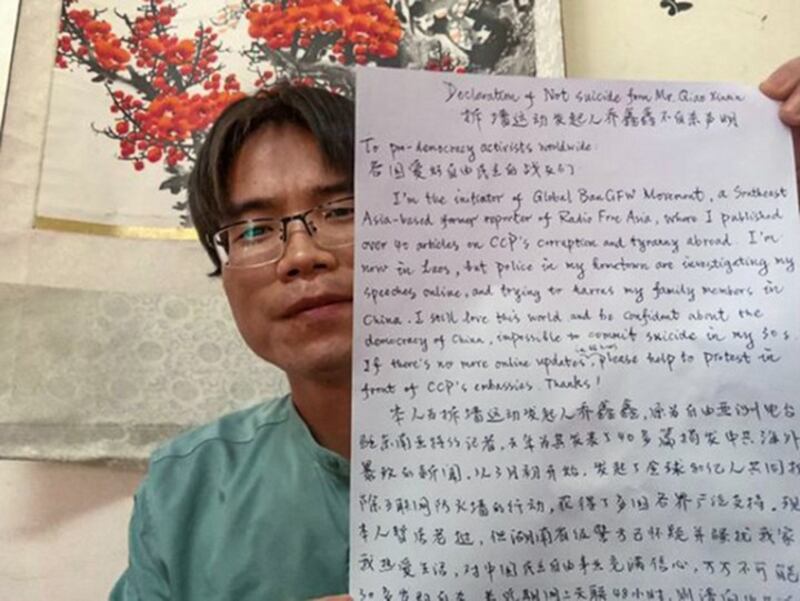Chinese nationals are seeking political asylum in ever larger numbers, but face transnational repression from China and lack of understanding from foreign authorities as they flee persecution, refugees and those who help them told RFA Mandarin in recent interviews.
A Chinese activist who supported an online free speech campaign that saw its leader arrested in Laos and is “terrified” of being sent back to China is now facing deportation from Denmark after her asylum application was rejected by authorities there.
Liu Dongling fled China in 2018 when her son was refused an education by authorities after she helped victims of forced evictions to apply for compensation through legal channels, she told RFA Mandarin in an interview recorded two days before World Refugee Day, June 20.
She said the authorities claimed they couldn't be sure from the evidence she submitted that she was at risk if she went back to China.
But Liu says she knows otherwise, citing repeated phone calls from a state prosecutor from her home city of Zhengzhou.
"I gradually realized that this Gaoxin District People's Procuratorate official called Li Hongbin had been put in charge of my case, relating to when I was helping others with their [forced eviction complaint] cases," Liu said. "I realized that the fact that he kept calling me put me in danger."
Who is a refugee?
The United Nations defines a refugee as someone who legitimately fears persecution due to their race, religion, nationality, belonging to a social group or having a certain political opinion, and is unwilling to return to the country for those reasons.
Yet foreign governments have been repeatedly criticized by rights activists for repatriating asylum-seekers who are then arrested and jailed on their return to China.

China also actively works to force its overseas dissidents to return home, sparking international concern over the Chinese Communist Party's " long-arm" law enforcement operations, which have included running secret police "service stations" in dozens of countries, according to the Spain-based rights group Safeguard Defenders.
Liu, who started writing for the overseas Chinese-language website Boxun after leaving China, also cites the forced repatriation of rights activists Dong Guangping and Jiang Yefei by authorities in Thailand around the time she left China.
"I was told by a colleague at Boxun ... that a lot of Boxun journalists had been detained in China, and that some had even been detained in Thailand," Liu said. "So I got more and more terrified."
Captured in Laos
Liu had also been a vocal supporter via X of an anti-censorship movement started by Lao-based activist Qiao Xinxin, who was later detained and forcibly repatriated.
Qiao, whose birth name is Yang Zewei, went missing, believed detained on or around May 31, 2023 in Vientiane, after launching an online campaign to end internet censorship in China, known as the BanGFW Movement, a reference to the Great Firewall, according to fellow activists.
His family were later informed that he is being held in a juvenile detention center in Hunan's Hengyang city in another example of China’s cross-border law enforcement activities.

Qiao had lived in Laos for several years before launching the BanGFW Movement, yet was believed to have been detained by Chinese police in Vientiane.
Radio Free Asia contacted the Danish Refugee Council by email about Liu's case, but had received no reply by June 19. Danish Repatriation Council official Tina Fjorside confirmed on Tuesday that Liu had now entered a process that will result in her forced repatriation.
Immigration jails are ‘hell on earth’
Thailand-based political dissident Li Nanfei told RFA Mandarin that he's now basically stuck in the country, playing an ongoing game of cat-and-mouse with Thai immigration authorities, and trying to stay out of their detention centers.
"Immigration detention centers are like hell on earth," Li said. "Human rights violations are very common, inmates are packed in very densely, and there is frequent violence."
Li spent his savings on bailing himself out of his last spell in detention, where he ran into plenty of other refugees on the run from China.
"The immigration prisons would hold onto them for a long time," he said. "Some people were held there for more than 10 years. Some even died in there."
Figures released by the United Nations' refugee agency UNHCR in June 2022 showed that while around 12,000 Chinese nationals sought asylum overseas in 2012, the year that Xi took office as Communist Party general secretary, that number had risen to nearly 120,000 by 2021.

The U.S. remains the most popular destination, accepting 88,722 applicants from mainland China last year. Australia took 15,774 asylum-seekers in the same year, figures showed.
New York-based current affairs commentator Ma Ju, who runs a refugee relief station offering two weeks of free food and accommodation to Chinese asylum-seekers in the city, said the refugees just keep on coming, despite the hazards of overland travel to the border with Mexico, known in Chinese as " walking the line."
"A very high proportion, about 80%, are here because of political, religious or ethnic [persecution]," Ma said. "A lot of ethnic minorities like Uyghurs, Kazakhs, Hui Muslims, Mongolians and Tibetans are there because of their religion or ethnic identity."
The vast majority can't live a life of any dignity back home in China, Ma said.
"They were in pain and misery every day -- there's nothing there for them, no dignity," he said, adding that only a small minority of refugees are basically there for what he termed "economic reasons."
In San Francisco, artist and rights activist Xiang Li has formed a group to help refugee women through art. Most of them are Chinese women.
"Some have psychological trauma and need treatment," Xiang said. "We haven't gotten to the point of offering counseling yet, but there is a kind of mutual support we can offer, which is sometimes even more effective."
Translated by Luisetta Mudie. Edited by Malcolm Foster.
